Text
I legit now want a fanfic with this premise.
Yuu is a horse girl.
She walks on four legs like a horse. She roleplays a horse in her idle animation.
Her witch form is a horse.
Ultimate horse girl I love her so much.
47 notes
·
View notes
Text
Yuu sometimes when talking will drop into this kinda spooky/intimidating voice. It's very sudden and I love it
96 notes
·
View notes
Text
As soon as Yuu was released the first thing i did was to listen to her voice lines, not only because of who is voicing her (the Sailor Moon!!) but because i was very curious as to what sort of dimension her voice would add to her character.
And it's particularly interesting the way that her voice sells how... empty she is, like not only in that losing her memories destroyed her sense of self and her morality (like i had initially expected), but in that she doesn't seem to have a firm grasp of anything beyond the ideas of "Yuu", Shii, the list, Magical Girls and Witches. Like, it's like she doesn't even know what being a human even is.
That much is obvious just in the way she speaks, like she keeps switching back and forth between multiple voices and running over her own words, like she speaks out of muscle memory and can't control the sounds that her mouth makes. But also, some of the stuff she says is... concerning, here's a few lines:
(I got these from her F*ndom quotes page i didn't know where else to find them)
"We're together today too... is that the same as yesterday? Does that mean tomorrow's gonna be the same!? And two days ago too? I guess after tomorrow too... wait so even today too!?"
From her first login, notice how by the end of the sentence she forgot about whay she said at the start completely. Also it's hard to convey through written text but, not only her sense of object and spacial permanence is nonexistent, she seems to genuinely have a hard time undertanding the concept of time:
"Did you just say good morning? Oh that must mean it's morning nowiseewaitdid i... did i sleep? I'm bummed... no i'm not, aha! Morning!"
Her morning login.
"Did you just tell me good night...? 'Good night' is what you say when you're done for the day!? So if we keep repeating 'good night' forever, can we stop tomorrow from coming...?"
Her night login
A couple of her lines showing her extremely short memory, and how it affects her fundamental understanding of things:
"Man, i'm so hungry... WAIT! I think i was just full...! Which was it! Doesn't it really suck how you can never tell what's inside of your tummy?"
Noon login.
"Sorry! I...! What was i thinking about? Do you know? Can you tell me? What a bummer, what a bummer... Wait, what was i bummed about?"
Her standard login (honestly same).
"I gotta get goinghmm...? Where was i going again?"
Story end 3
"If your arms or your legs get really old, then why not just rip 'em off? It's gonna grow new ones so it's okay, here, lemme help you!"
Tap 4.
"Nagisa-chan loves cheese, meanwhile i have 'someone'... 'someone' is me! So don't forget about cheese and 'someone' even when tomorrow comes, alright?"
Magical release 1
"Y'see, ghosts only come from the past, they don't be coming from the future! So why... can i only go to tomorrow?"
Magical release 2
Also this one is just, man...
"No matter how many times time turns back, i'll keep doing the same thing! 'Cause i don't wanna pretend that all the times i messed up and all the times i was sad weren't real!"
Tap 8
It's also extremely unnerving how genuinely childlike and innocent her "main", higher pitched voice is, like i can't explain why but it really sells that she does what she does all because she genuinely doesn't know any other way to live, not least because it seems she wholeheartedly doesn't seem to be able to think beyond the current moment, like she just goes with the flow of time without having anything to ground herself on.
I think that, while having a fully fledged design added to her "inhuman" factor in a creepy manner, like, compounding to the idea of this beastly Magical Girl that rips people's organs off, her voice made her "inhuman" in a much crueler and sad way, in that it served to illustrate that she is the way she is because it's quite literally the only way of living that she knows.
89 notes
·
View notes
Text
Remember the P25th Anniversary concert that had Shuake dancing to "Throw Away Your Mask?" sung by Lyn?
Well here is the full Shuake dance to that song! I think they really used MMD in this and I LOVE IT! ☕🥞💞
231 notes
·
View notes
Text

'The Survivalist'
So it's come to my attention that some of you younglings in the community DON'T KNOW WHO ANGUS IS. Lemme introduce you to the FIRST EGO: Angus the Survival Hunter! Basically Aussie Bear Grylls but in minecraft, and my first ego before ANYONE else. The ANCESTOR of Egos, I daresay.
125 notes
·
View notes
Text
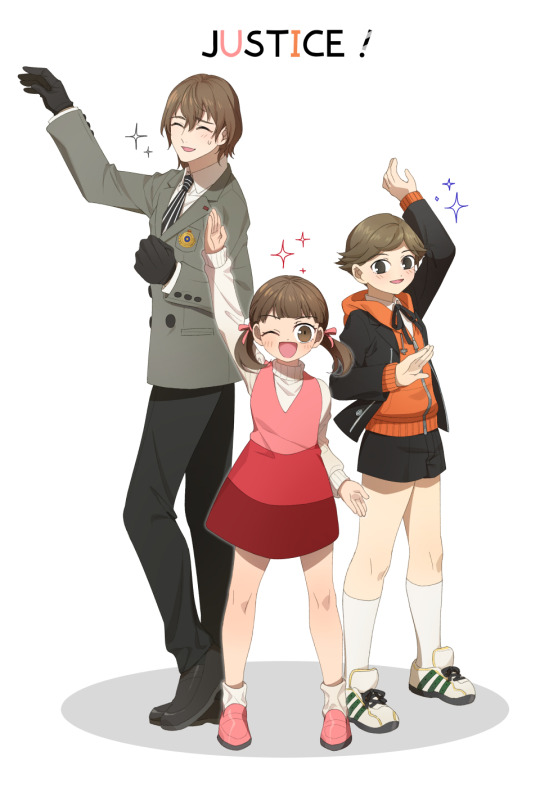




some AKC fanart commission that I did for others
Please Do Not use
260 notes
·
View notes
Text
(Technically not yuri, but close enough)
Ah, ShuAke... My favourite anime lesbians.
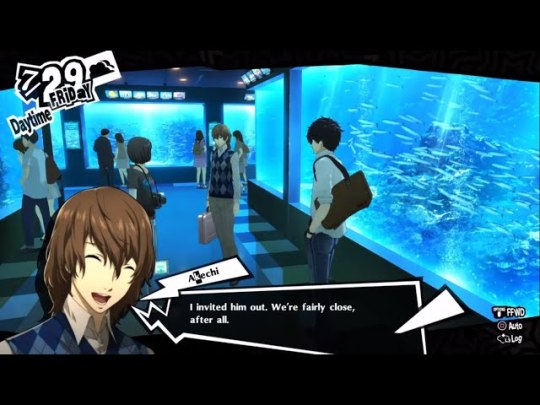

if there’s one thing i’ve learned it’s that lesbians are apparently buying up all the aquarium tickets in anime and manga
305 notes
·
View notes
Text
I've had a realisation,
So, we all like to dunk on Akechi for having a stupid plan- which, well, yeah; but I think that a lot of people (whether they like Akechi's character or not) tend to miss the point:
That being, that the holes we all poke in his plan; "Why didn't he just kill Shido at the start?" "There's no way he'd live/be free after that," "His plan to ruin Shido's reputation would never work," are actually far more revealing as to Akechi's priorities, than they are of him just being 'stupid'.
For starters, "there's no way he'd live/be free after that." -as a fandom I think we've all already come to the conclusion that Akechi's regard for his own life is spotty at best. I wouldn't necessarily say that he wants to die by the time of the third semester, which really just adds to the tragedy of the whole situation, but I digress. Point is, the kid needs therapy, moving on.
"His plan to ruin Shido's reputation would never work," Ah, now this is where I think some cultural differences start to come in to play- I won't say much, since I'm relatively uninformed, but by the sounds of it, revealing that Shido has an illegitemate child is actually the kind of thing that would make a lot of people raise their eyebrows. And, more importantly, the kind of thing that would really throw his "easy election win" into some serious jeapordy. (AND, it's never exactly stated that "revealing himself as an illegitemate child" was Akechi's tactic to ruin Shido- more of a "hey, Shido, guess who it was that ruined you, you piece of shit?"- which, well, more on that mindset later)
Next, "Why didn't he just kill Shido from the start?" This is where I think a lot of people get tripped up. To my memory, there is not a single point in the engine room where Akechi says that killing Shido is the cornerstone of his plan (localisation differences notwithstanding. I'm sure someone will come yell at me (/lh) if this is the case). Now, to be fair, Akechi in the engine room is really just him giving a very desperate powerpoint while he sharpens his sword- so I don't doubt that he's skimming over a couple points. But, you'd think that Akechi would remember to mention that if that really was his main goal.
Okay, so Akechi doesn't want to kill Shido. Cool, follow-up question, "Why didn't he just give Shido a pshychotic breakdown from the start?" That's the kind of thing that would have ruined Shido's reputation, too, right? And, it would have been before he would have had the means to try and cover it up. Well, finally, I can get to my point:
Akechi needs Shido's disgrace to be loud, because he needs everyone else to care, too. Akechi's revenge isnt just against the man who left him and his mother for dead, but also against the society that continued to leave him for dead, again and again; the society that only lauded him as something special if he slapped some pretty wallpaper over the past he had absolutely no control over.
Looking at it like this does a lot of things:
First, it really amps up the whole "the PT's justice and Akechi's justice foil each other". Akechi's revenge is also a vehichle for revolution, since it is, in essence: "Look! Look at the man who you lauded as a saviour! Look at me, the man who brought him down. Aren't we both disgusting, in your eyes? Take a look at yourselves. Aren't we all the same?"
That leads pretty nicely into Akechi as a pawn for Yaldabaoth, too. Akechi wants to make sure he and Shido go out with a bang, and leave a shitshow in their wake. That's prime God of Control real estate! It's also prime "metaphor for Ruin" real estate; you get the point.
And, finally, an interesting point comes from all of this. That being, that, well- the only reason that Akechi's plan wasn't going to work, is that he placed too much stock in the idea that Shido has any concept of loyalty or gratitude. Shido, as we all know, is an absolute piece of shit- and still, Akechi had believed that maybe, just maybe, his father would feel bad for being terrible to his son.
(I'm not going to go on too big of a tangent, but that is an interesting insight into Akechi's idea of Justice, and into what his personas might represent. Contradiction, as ever, is the name of the game, and Akechi simultaneously believes that there's no way to get anywhere in life without force and violence, and that there is also a fundemantal truth of what is good and fair within human hearts)
The message of this, I'm pretty sure, is not: "Akechi failed because of that lingering belief in humanity" (wouldn't that be one hell of a heel-turn lmao), but rather: "Akechi, with his distorted (ha) priorities, was never going to be happy in any quest for vengeance, even if his plan succeeded entirely"
tl;dr, Akechi needs therapy. Wait- Maruki, no! Not that kind of therapy!
596 notes
·
View notes
Text
Thinking about Akechi and philosophy again. Particularly his mention/very superficial glaze over hegelian dialectics. It's really weird to me that some people seem to go "he misquoted hegel sjjsjsjsjkaks" and then give an explanation of dialectics that shows that... they don't fuckin understand dialectics fully themselves.
Which is understandable considering Hegel was an idealist and idealism tends to require some weird logic to understand. (Akechi seems to in canon reference a lot of idealists which is hhhh, so I depict him as a materialist out of spite) I also haven't fuckin read Hegel myself, so I can't perfectly explain hegelian dialectics. However, I can sure explain dialectical materialism to an extent cause i've done my homework there at least. And like having an understanding of dialectics in general is a key part to understanding that crap. So I look at this quote right

this one? and im like well, in explaining dialectics he aint fuckin wrong. Now did Hegel explicitly state this? Idk, i don't feel like cracking open the 300 pager that is The Phenomenology of the Spirit right now. It's 1AM. And if he didn't, that is okay. Look, Karl Marx didn't fuckin explicitly explain dialectical materialism either. We still credit it to him though, since it is the method he designed and used. Also if you're wondering where thesis and antithesis comes from, it's from Kant. Kant is one of the many that influenced Hegel.
Moving on to the actual paraphrase. Again, Akechi ain't wrong. Contradiction exists in all things, and yes to advance you must resolve the contradiction. This is where people who bring up the "Akechi forgot the synthesis!" get kind of on my nerves because he didn't. One cannot have advancement(synthesis), without resolving the preexisting contradiction (thesis and antithesis). Hell! even if you ditch the idea of synthesis, he could still be right about dialectics, just not hegelian dialectics. Akechi uses the term advancement, which allows us to play with the possibility that maybe his approach to dialectics is through marxist dialectics. A synthesis, in the constant motion of the dialectic, would become another thesis with it's own antithesis and then fuse into another synthesis. The pattern continues. In dialectical materialism, we see that 1) multiple contradictions can exist simultaneously, and 2) That change occurs not by fusion of the thesis and antithesis, but when the intensity and opposition of the contradiction grows until it bursts into a new contradiction. Although, Akechi is talking about hegel to paraphrase the general concept of the dialectic, and could be purposefully using "advancement" instead of synthesis to highlight the constant motion of the dialectic, but maybe to obfuscate what kind of dialectical method he puts more stock in. Dialectical materialism can kind of be like dirty word in philosophical spheres because it is marxist. I doubt the writers for the game could get away with it either, considering the kind of ending message the game was given.
But also like I doubt the writers did a super deep dive into dialectics. And it would be kind of weird to have a game where there is literally an immaterial world based entirely on thought, start using a materialist dialectical method instead of an idealist one. Even then for a simple throwaway comment about dialectics, it is still accurate enough.
Anyways, I'm not a philosopher. I'm a sociologist and an artist. My fiance is the philosopher, and I fully expect them to correct my ass on some parts in the replies if they see this post.
253 notes
·
View notes
Text
i decided to post this by itself because i don't understand how tumblr works anymore and i wanted it to show up in the relevant tags, but... the following is a note on this post.
tl;dr (yes, at the start): some of the confusion regarding how well akechi understands (hegelian) dialectics in the english-speaking fandom may be due to a choice made by the translators during the localization process.
in the japanese version -- which i don't have right in front of me, so i'm going off my memory -- akechi uses the technical term "aufheben," which is typically translated to "sublation." (see section 1, paragraph 2.) it's extremely difficult to explain what sublation is, but it is not exactly the same as a "thesis" (X) and separate "antithesis" (not X) coming together and "synthesizing," which seems to imply their differences have been cancelled, that they've reconciled (i.e., are no longer in conflict), or that the terms "X" and "not X" have somehow disappeared.
rather, "aufheben" or "sublation" is supposed to describe a specific process of becoming that belongs to the kind of activity dialectic is, where a given thing -- let's just keep calling it X -- preserves its individuality in the process of encountering its opposite (not X) at the same time that this encounter changes X in its fundamentals. crucially, this all takes place within X; it doesn't encounter its opposite in the form of an external force, but as a function of its (for lack of a more elegant phrase) taking itself to task for its own contradictions.
i know this is very vague, so perhaps the easiest or most intuitive way to understand "aufheben" is to think of it as a moment of self-realization. a really stupid, topical example: i might say i hate someone. still, after spending a lot of time with my feelings of hatred for this person, i might realize that this hatred expresses envy for those things i like about them and that i wish i possessed myself. note that in realizing the foundations of my hatred for this person are affection, i haven't also negated my hatred of them; that is, i don't love them instead now, and i don't hate-love them, either. rather, i've realized that my hatred and my affection for them are inextricably intertwined. this is a really, really bad -- but i hope evocative -- example of "sublation" (or, at least, an aspect of how it works).
the reason this translation difference is notable is that the original's reference to "aufheben" implies that akechi actually has a pretty sophisticated understanding of hegelian dialectics.
that's right: akechi is enough of a nerd to have read the phenomenology of spirit in his spare time, which is not an experience i would recommend to anybody. (that, or: in japanese, it's more common to speak of "aufheben" than "synthesis" -- but this would still give him a more sophisticated understanding of hegelian dialectics than the typical english speaker. i don't actually know if this is the case in japanese-language discussions of hegel, but perhaps i will make some time to check in the future.)
it is fairly common -- though, as i've tried to suggest above, strictly speaking incorrect -- to paraphrase hegel as akechi does here, at least among english speakers. this is in part due to translation difficulties with the word "aufheben." the english translators probably went with thesis/antithesis/synthesis here because the game's audience is more likely to have heard of this trio, and they probably wanted to spare you the experience of googling what the fuck "sublation" means.
-- a pity, because "aufheben" is pretty fitting for akechi's entire chatacter; this moment could even be taken as one of the game's first hints at his character arc.
24 notes
·
View notes
Text
TW: Hegel.
So, what’s up with Shuake and dialectics? Click below to watch this user (who is not a philosopher) give this (frankly too invested) analysis a shot!
Something I’ve been thinking about a lot lately is the fact that most– but not all– of Joker’s confidant routes involve some sort of transaction. Joker does something for someone, Joker gets a favor in return. Joker’s identity revolves around what he can do for others. He’s got a different mask (haha game mechanic is narrative device etc.) for everyone in his life.
Getting a little bit in my head about this led me to a (not-all-that-novel) realization: Akechi’s confidant route is largely non-transactional. Sure, he says that he wants to meet with you to talk about the Phantom Thieves, but that more or less directly translates to just wanting to hang out with you. The “favor” that you're doing for Akechi, if we follow the logic of some of the other confidant routes, is spending time with him. And really, that’s what your relationship with him is, up until you realize the heart he needs you to change is actually one of the big-bads of the game. And at that point… Well…
Where am I going with this? I’ve also been thinking a lot about Hegel (I’ve seen some really fun posting about Akechi and Hegel on here this past week– thank you philosophy P5R tumblr!). Akechi’s paraphrasing of Hegel goes a little something like “advancement cannot occur without both thesis and antithesis.” Hilariously, this is how he frames his desire to talk to you more, his flirting is just like me forreal I understand him etc. etc. BUT! The interesting thing here is that the game is cueing you to view your relationship with Akechi through the lens of Hegel’s dialectics.
More on that to follow, but first, I want to plug the Stanford Encyclopedia of Philosophy’s page on Hegel’s Dialectics here– If you haven’t used it before, SEP is a reliable, peer-reviewed source. It’s great. I use it like. All the time. It’s good for getting the gist of big ideas when you don’t have time to read full texts. (Also if I get any of this wrong please know that philosophy is not my field and I’m totally open to constructive criticism.)
Hegel’s dialectical process revolves around three key moments: the moment of understanding, the dialectical moment, and the speculative moment. These moments can also be referred to as thesis, antithesis, and synthesis. The moment of understanding, thesis, is the point at which an idea is seemingly stable. In the dialectical moment, antithesis, this idea “sublates” itself– the idea is challenged and destabilized because an inherent contradiction in the idea has been made apparent–importantly, part of the idea is preserved. The speculative moment, synthesis, negates the contradiction. A new idea takes form, containing elements of the original idea that was sublated (Marx’s theory of history, anyone?)
This process continues on and on. Ideas naturally reveal their contradictions, are destabilized, and resolve their contradictions through the creation of a new idea, which is challenged again. This is because the dialectical moment does not come from outside an idea. Antithesis is not an external push against thesis, but rather, the moment when thesis is forced into instability because of its own tightly-bound restriction.
So back to what I was saying. The game kicks off your relationship with Akechi with a nod to, uh, all of that. Could this be a throwaway comment? Of course! But it’s much more fun to work under the assumption that it isn’t. So bear with me. Akechi is framing himself and Joker as thesis and antithesis. What does that mean? Why do I think it has something to do with Akechi and Joker’s relationship being non-transactional?
Previously, I’ve thought that in the context of their relationship, Akechi represented thesis, and Joker antithesis. This isn’t exactly true (at least per the criteria above) but I do think I was on the right track.
At the beginning of his story, we can think of Akechi’s worldview as thesis. The world is a stage, and he is a performer. His entire life is dedicated to destroying Shido. It’s a key narrative element of P5 that Akechi doesn’t have confidant relationships (as contrasted by Joker, who has many confidants and becomes stronger through building up those bonds). He views himself as deceiving literally everyone in his life for his goals– his “fans,” his father, the Phantom Thieves. He doesn’t trust, because to him, trust is failure.
Still, he’s starving for approval, and not just from Shido. You can see the inherent conflict between his desires and beliefs in just about every interaction he has with Joker, particularly those where Akechi overshares about his past. He desperately wants someone to hear him. I don’t think his (primary) aim in that was to strategically win Joker’s trust by showing vulnerability– if that was all he was going for, I doubt Akechi would have been so honest. He omitted information, sure, but he gave Joker the honest-to-god broad strokes of his childhood.
When Joker comes into his life, Akechi comes to realize that his stable worldview might be wrong. Watching Joker and the rest of the Phantom Thieves reveals the cracks in his own internal logic. Joker has friendships and he is stronger because of them. When Akechi sacrifices himself for the Phantom Thieves on Shido’s ship, we see his moment of synthesis. If Akechi really still internalized all of what he said in his “Teammates? Friends? To hell with that!” monologue, he wouldn’t trust Joker to change Shido’s heart in his stead. To be clear– he probably would have reached this point with or without Joker’s intervention. Joker just happens to push Akechi towards self-sublation a little bit faster.
In Royal, we see a new iteration of Akechi. He doesn’t really regret his actions, and he is still very distinctly Akechi, but we can see that his original perception of the world has made a shift. He is willing to team up with Joker. While he may not place a great deal of faith in all of the PTs, he certainly has real trust in the protagonist. He’s learned that he can be recognized (dare I say loved?) without being perfect, and accordingly, his driving desire for approval has been displaced by his desire to never be so completely under anyone else’s control again.
But ok— that’s kind of an old take. Perhaps a hotter one: I’d also like to propose that Akechi does the same for Joker.
As mentioned above, Joker’s identity for most of the game is defined by what he can do for the people around him. While a large part of this has to do with the fact that he is a playable character, this is a game, and a game needs to have things for you to do– it wouldn’t be very fun otherwise– it also seems pretty clear that this is part of his characterization. Joker is selfless to a fault. Like Akechi, he is a wildcard who can take on multiple personas. Unlike Akechi, instead of having a handful of personas directly linked to the core of his character development, Joker has as many personas as you want him to. He literally has a mask for every situation. You can equip a persona of the correct arcana to level up your relationships faster– a game mechanic, but also, an interesting meta statement about how Joker bonds with his confidants.
In Royal, however, Joker has the option to do something for himself. His greatest wish isn’t for someone else's happiness– it’s to have Akechi back, for selfish reasons, I would argue. Joker can sacrifice reality to keep him in his life, and depending on the actions you choose to take, sometimes, he does.
Loving Akechi teaches Joker to be selfish. This is especially poignant when you think of how adamantly opposed Akechi is to staying in Maruki's reality. Giving up the true reality to keep Akechi is a wholly selfish act on Joker's part, nothing altruistic about it. And if he doesn't make that choice? Well, don't forget about how Joker spent his wish.
He would have learned how to do this without Akechi– one tends to realize that neverending self-sacrifice is unsustainable sooner rather than later. Again, Akechi just pushes Joker towards effecting that self-sublation a little faster.
By spending time with Joker, Akechi learns that there are people he can truly trust. By spending time with Akechi, Joker learns how to put himself first. Their confidant relationship from this perspective is not only transactional, it’s actually one of the most transactional relationships in the game. Joker actively impacts how Akechi sees himself and the world around him, and vice versa. Their relationship is profoundly transformative for the both of them. To paraphrase Akechi, advancement cannot occur without both thesis and antithesis.
But also, we can forget dialectics for a second. Even without a fun analytical lens, Akechi’s confidant route centers two misunderstood people who find understanding in each other. That’s enough for me!
50 notes
·
View notes
Text
youtube
This is one of, if not THE, best April Fools jokes ever, and may even be the very first to air on "serious TV". The prank was aired April 1 1957 at the end of the BBC current-affairs programme “Panorama”.
It was helped by spaghetti being a rare exotic food in 1950s Britain, and narration by the hugely respected journalist and presenter Richard Dimbleby made it utterly convincing.
Afterwards people either got the joke - or didn’t, and wanted to grow their own spaghetti trees. These optimists were told to “place a length of dry spaghetti in a jar of tomato sauce and hope for the best”.
*****
The entire spoof got it wrong, of course, since free-range organic spaghetti doesn’t grow on trees at all.
In actual fact it’s a kind of marshland reed, and very seasonal, only available from March 15 (when by tradition the first harvest is made by use of many small sharp knives) through until April 2nd, when it’s officially declared to be stale.
Extruded lengths of flour-water-egg paste - originally called spaghetti finti or spaghetti di casa - replicate these reeds while being available all year round.
*****
Some humourless pundits indulged in sputtering outrage that such nonsense was part of a serious programme, but "Panorama” producer David Wheeler stuck to his guns, suggesting that viewers needed a more critical attitude to what was shown on TV, and shouldn’t believe everything they saw.
What would he have said now?
*****
@dduane says that for US readers to understand just how effective it was, imagine the same thing on “60 Minutes”, voiced with equal sincerity by Dan Rather.
*****
And oddly enough, what we’re having for supper tonight will be...
Probably not spaghetti.
;->
590 notes
·
View notes
Text
Wondering what boop count your 3 letter word corresponds to? I gotchu:
Using a python script I wrote, I booped myself 50,000 times, saving an image of my boop-o-meter every 500 boops. Before we get into the results, there are two important limitations to this study that I should mention:
Firstly, because I only recorded the boop-o-meter every 500 boops, if a message appeared for less than 500 boops it may not have been caught.
Secondly, every now and then my computer would lose a boop or two when a click wouldn't register. This is seen in the 500 and 1000 boop images below, which in reality read 498 and 994 respectively. Because of this, boop values are slightly lower than they appear.
With that out of the way, lets dig in.
0-999:
From boops 0-999, the boop-o-meter displays your boop count, and changes color as you boop

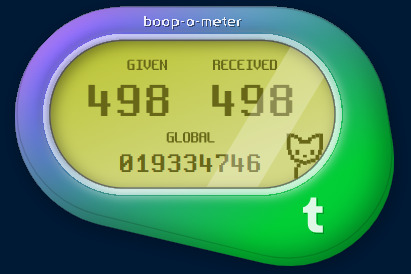

Boop count: 0 Boop count: 500 Boop count: 1000
Boop fact: the colors do not change after 1000
LOL:
Between boops 1000 and 1500, the boop-o-meter changed to display 'LOL'. This likely took place at 1000 boops, but maybe it said 'MAX' or sumn for awhile at first? Idk this is already the misinformation website so not my problem.
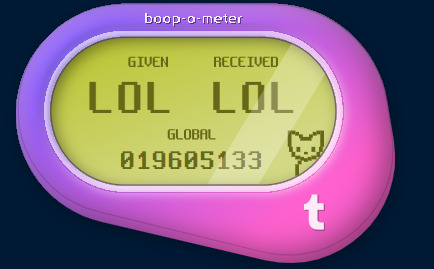
Boop count: 1500 (actually more like 1490 ish)
More results below the cut
OMG:
Between 1500 and 2000, the boop-o-meter changed to display 'OMG'. Again, this probably happened at 1500 but who knows. Maybe staff made it 1523 for the bit or something.

Boop count: ~2000
WOW:
The boop-o-meter remained at omg until the 3500 boop readpoint, when it switched to 'WOW', meaning this transition happens somewhere between ~2980 and ~3480.

Boop count: ~3500
Boop fact: 'WOW' is the second longest reigning message
*-*:
Between 5000 and 5500 the boop-o-meter switched to '*-*'. You get the idea at this point so I'll speed it up.
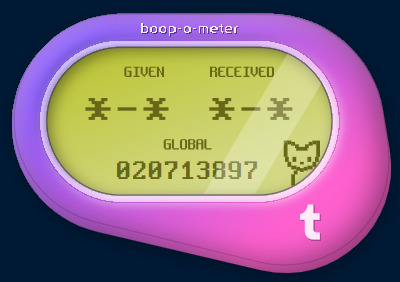
Boop count: ~5500
WHY:
The boop-o-meter changed to 'WHY' between 6000 and 6500 boops. For science. That's why.

Boop count: ~6500
PLZ:
Next was 'PLZ', switching between 7000 and 7500.

Boop count: ~7500
AAA:
I'm not sure what bloody urine has to do with anything, but for some reason staff felt is was important to display, switching between 7500 and 8000.
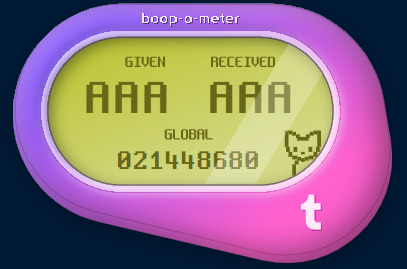
Boop count: ~8000
;_;:
Huh the colon makes that one look weird. 8000-8500.

Boop count: ~8500
Boop fact: That fucking cat haunts me in my dreams
0_0:
I realized after I set my pyautogui script running that my computer wouldn't turn off its screen because of the clicking, so there was a strobing blue light in my room all night. This encapsulated my expression while trying to sleep (8500-9000).
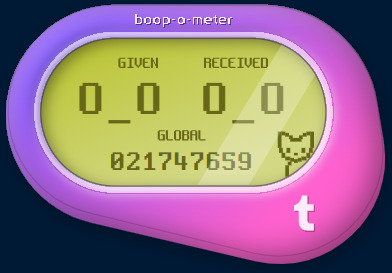
Boop count: ~9000
MAX:
After 9000 it displayed 'MAX'. This was cap. (9000-9500 switch).

Boop count: OVER 9000 (9500)
<33:
I miss my wife. 9500-10,000.

Boop count ~10,000
TUM BLR:
THE HOLY GRAIL. The boop-o-meter switched to displaying 'TUM BLR' between 10,000 and 10,500 boops. Because my actual boop count was slightly behind my theoretical, I'd guess that this change happened at 10,000 boops.

Boop count: ~10,500 (likely switched at 10,000)
Summary:
When charted the boop curve looks as follows:

Boop curve: 0 - 10,000 boops
My script continued to run until 53,000 boops, but no further changes were observed. Again, there were quite possibly more messages at lower boop values, but my ass is not checking. Maybe I should have scaled my sampling accordingly, but it is what it is. Thank you for joining me on this journey, and if you have any corrections or more information, please add it to this post.
Boop fact: Terfs DNI
7K notes
·
View notes
Text
(I will boop everyone who reblogs this post, for the record 💖)
55K notes
·
View notes
Photo

★ ツグトク | 博士と氏のまとめ ☆
⊳ jekyll (fate/grand order)
✔ republished w/permission
⊳ visit my insta / twitter / blog
173 notes
·
View notes


